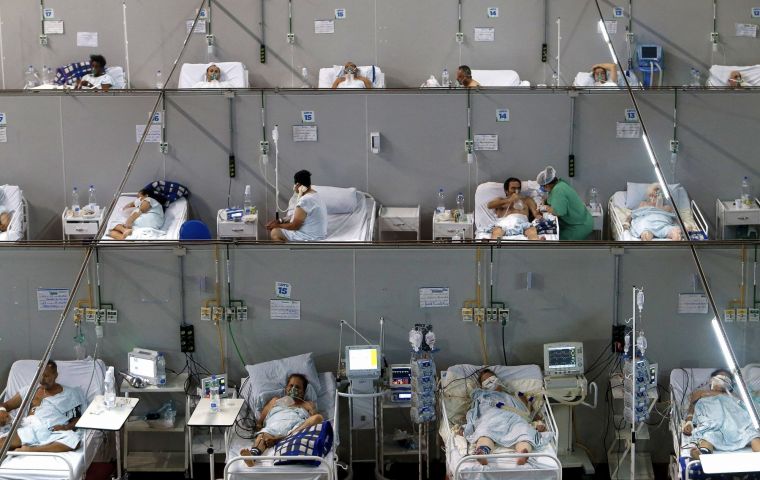MercoPress. South Atlantic News Agency
Over 25 million cases of Covid-19 reported in Latin America, Caribbean
 PAHO has warned that this second wave could be more extensive than the previous one particularly due to the accelerated expansion of the Brazilian variant
PAHO has warned that this second wave could be more extensive than the previous one particularly due to the accelerated expansion of the Brazilian variant Latin America and the Caribbean have altogether exceeded 25 million covid-19 infections amid an unprecedented advance of the pandemic which has led to the most severe restrictive measure by some countries, it was reported Friday.
Chile will close all its borders from Monday despite a prolific vaccination campaign, while records of daily infections in Peru or deaths in Uruguay continue to raise alarms.
While immunization progresses at each country's own pace, the United States have already vaccinated some 100 million people with at least one dose, according to data from the health authority released Friday. “More than one in five adults is already fully vaccinated,” said Rochelle Walensky, director of the CDC. The health authority said, meanwhile, that those vaccinated can travel again with precautions, although those arriving from abroad must present a negative test.
President Joe Biden, who promised last week that 90% of adults would be able to receive vaccines before April 19, nevertheless asked again “not to lower our guard”, to “finish this work” against the pandemic.
In Florida, one of the favourite destinations for tourists, Governor Ron DeSantis banned the use of “vaccine passports”, considering that they reduce individual freedom. The creation of a digital health certificate is discussed in the European Union, almost a month after its launch in China.
In Chile, which has already vaccinated 24% of the target population with two doses and is progressing faster than any in Latin America, the worst numbers of infections since the start of the pandemic have been recorded in recent days. Against this background, the authorities announced Thursday that they will close the borders from Monday through April. In total, the country exceeded one million infections and 23,000 deaths.
The situation is also worsening in Ecuador, where a state of emergency has been declared for 30 days in several provinces, in the face of pronounced increases in infections. These new infections are due in part to the new variants of the virus, which affect sectors of the population until now more preserved and aggravate the symptoms of some, according to the government. The second round of the presidential elections on April 11 will continue, with health security measures strengthened.
For its part, Uruguay, until recently considered an example in the management of covid-19, registered 35 and 32 deaths from covid-19 on Thursday and Friday respectively, two daily records, with deaths exceeding 1,000 since the beginning of the outbreak. However, the administration of President Luis Lacalle Pou advocates for “responsible freedom,” while resisting pressure from opponents to impose restrictions. In Uruguay, almost 20% of the population has already been inoculated with the first or second dose of CoronaVac or Pfizer.
In many countries in the region, there are cases of the Brazilian variant of the coronavirus, the so-called P1, which is believed to be more contagious. Brazil, a concern for its neighbours and the region, experienced the worst month of the pandemic in March with more than 66,000 deaths for a total of 321,000 deaths.
Among the states that apply sanitary measures, Rio de Janeiro announced on Friday a partial extension of the restrictions, initially planned until Sunday. For example, non-essential stores, bars and restaurants, cinemas, museums and theatres will not be able to operate again until next Friday.
Brazil has vaccinated about 8% of the 212 million citizens with the first dose and 2.3% are fully immunized. Analysts blame this pace on President Jair Bolsonaro's approach at the issue. He minimized the severity of the disease, which delayed agreements with pharmaceutical companies for the supply of vaccines, although some are produced locally in the famed Butantan Institute in Sao Paulo.
Pan American Health Organization (PAHO) Director Carissa Etienne has insisted there were not enough vaccines in the region to stop the active outbreaks and advocated prevention. “Now we don't have enough vaccines to stop active outbreaks,” she noted.
PAHO has warned that this second wave could be more extensive than the previous one particularly due to the accelerated expansion of the Brazilian variant. The situation is becoming more unsustainable every day, particularly in Brazil, which today has become the epicenter of the pandemic and has an average record of 2,000 deaths a day. With a health system already collapsed and the risk of a deficit of drugs and oxygen, different institutions have already asked for international help. Other countries, like Bolivia, are conducting containment measures with border closures.
“Let me be clear on this. Without preventive actions, our region could face an even longer wave than the previous one,” Etienne said. ”In this pandemic, complacency leads to more cases (...) The risks for its population and health systems are too high,” she added.
In Chile, more than 7,000 cases were registered daily for five consecutive days until March 29. Faced with this panorama and despite being an example in the vaccination plan, the government decreed measures of confinement and the closure of all borders.
Cases in Bolivia have also increased, particularly in areas bordering the border with Brazil, where the government deployed biosecurity equipment, tests and vaccines, according to the health ministry.




Top Comments
Disclaimer & comment rulesCommenting for this story is now closed.
If you have a Facebook account, become a fan and comment on our Facebook Page!